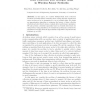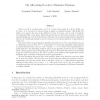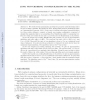118
click to vote
SSS
2009
Springer
15 years 8 months ago
2009
Springer
We consider setting up sleep scheduling in sensor networks. We formulate the problem as an instance of the fractional domatic partition problem and obtain a distributed approximati...
108
click to vote
FSTTCS
2009
Springer
15 years 8 months ago
2009
Springer
We describe a simple iterative method for proving a variety of results in combinatorial optimization. It is inspired by Jain’s iterative rounding method (FOCS 1998) for designing...
WINE
2009
Springer
15 years 8 months ago
2009
Springer
We propose approximation algorithms under game-theoretic considerations. We indroduce and study the general covering problem which is a natural generalization of the well-studied m...
110
click to vote
WASA
2009
Springer
15 years 8 months ago
2009
Springer
In this paper, we consider Multiple-Sink Data Collection Problem in wireless sensor networks, where a large amount of data from sensor nodes need to be transmitted to one of multip...
ICC
2009
IEEE
15 years 8 months ago
2009
IEEE
—In this paper, we study the problem of computing the supported QoS from a source to a destination with multiple additive constraints. The problem has been shown to be NP-complet...
FOCS
2009
IEEE
15 years 8 months ago
2009
IEEE
Given a set A of m agents and a set I of n items, where agent A ∈ A has utility uA,i for item i ∈ I, our goal is to allocate items to agents to maximize fairness. Specificall...
116
click to vote
STACS
2010
Springer
15 years 9 months ago
2010
Springer
We revisit several maximization problems for geometric networks design under the non-crossing constraint, first studied by Alon, Rajagopalan and Suri (ACM Symposium on Computation...
126
click to vote
SODA
2010
ACM
15 years 11 months ago
2010
ACM
The class of constraint satisfactions problems (CSPs) captures many fundamental combinatorial optimization problems such as Max Cut, Max q-Cut, Unique Games, and Max k-Sat. Recent...
STOC
2002
ACM
16 years 2 months ago
2002
ACM
: We initiate the study of a new measure of approximation. This measure compares the performance of an approximation algorithm to the random assignment algorithm. This is a useful ...
119
click to vote
STOC
2007
ACM
16 years 2 months ago
2007
ACM
In an online linear optimization problem, on each period t, an online algorithm chooses st S from a fixed (possibly infinite) set S of feasible decisions. Nature (who may be adve...




